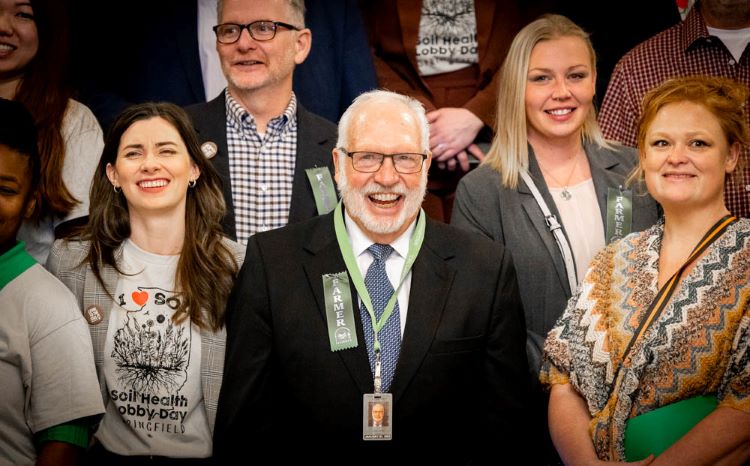Dick Lyons, a former agricultural professor at Lincoln Land Community College and Illinois State University, was among the four founders of Illinois Soil Health Week. He was recognized as the top corn and wheat producer, and the fourth-highest soybean producer in Montgomery County during a census conducted in 2018. Dick attributed his success to implementing conservation practices like no-till farming and cover cropping, which helped release nutrients in his soil while keeping water runoff clean. His story can be found on AIMillinois.org.
During his presentation titled “The Art and Science of Soil Health Advocacy in Action” on Day Thursday, March 7, 2024, Dick Lyons shared his thoughts on Soil Health Week:
“It’s a pleasure to be surrounded by familiar faces and meet the young individuals donning the light blue polo shirts from the AIM Initiative, founded by Dr. Michael Woods. This week has been truly gratifying.
One of the most influential quotes that resonates with me is from Franklin D. Roosevelt in 1937, during the heart of the Dust Bowl: ‘The history of every great nation is written in the way it treats and cares for its soil.’
Since time immemorial, humanity has relied upon the soil and the land to provide sustenance and resources for its well-being. Soil is the foundation of everything. Famines, droughts, flooding, dust storms like the Dust Bowl, or the recent incident south of Springfield last year, highlight the crises that arise when we neglect the soil’s importance.
As a conservation farmer in Montgomery County, Advocacy Day is crucial to me because soil health is the cornerstone of our 4th generation farm, founded by an Irish immigrant. I am morally compelled to spread the word and educate everyone about the significance of soil health. It’s ingrained in my soul and my heart. We, as farmers, consumers, and as the Illinois Stewardship Alliance says, have a moral obligation to prioritize soil health.
The most glaring reason to advocate for soil health is that tillage, which destroys soil health, also disrupts soil aggregation, the foundation of soil health. This lack of soil aggregation due to tillage led to the loss of eight lives on I-55, just south of Springfield.
I was in the field that day, side-dressing my corn with 28% nitrogen. I witnessed the dust billow up around 9 o’clock. I called my wife, Sharon, with whom I’ve been married for 57 years this April Fool’s Day – a fitting date for our union. I watched as the black smoke rolled in at 10:30, and the tragic loss of life began.
Another crucial reason to advocate for soil health is its ability to reduce erosion. Without cover crops to hold the soil in place, we risk losing valuable richness downstream into the Gulf of Mexico. As Charlie mentioned yesterday, the only way to produce new farmland is to farm the delta in the Mississippi River – an impractical solution. Cover crops are the foundation that prevents soil loss, protecting our drinking water sources like Lake Springfield, Lake Lou Yaeger in Litchfield, and Glenn Shoals Lake in my county.
The fourth benefit of soil health practices is reducing greenhouse gas emissions, something I never fully considered. Hugh Hammond Bennett, the first director of the Soil Conservation Service (now the Natural Resources Conservation Service), said, ‘Soil erosion is as old as agriculture. It began when the first heavy rain struck the first furrow turned by a prehistoric man with a moldboard plow that he had created. It has been that going on ever since. Whereverman’s culture of the earth has bared the soil to rain and wind, erosion occurs.’
Finally, soil health increases the microbial population, something we never studied when I was in college. Now, universities are exploring microbial activity in the soil and its ability to recycle nutrients already present from years of livestock farming. This nutrient recycling keeps them on the land instead of washing them downstream.







